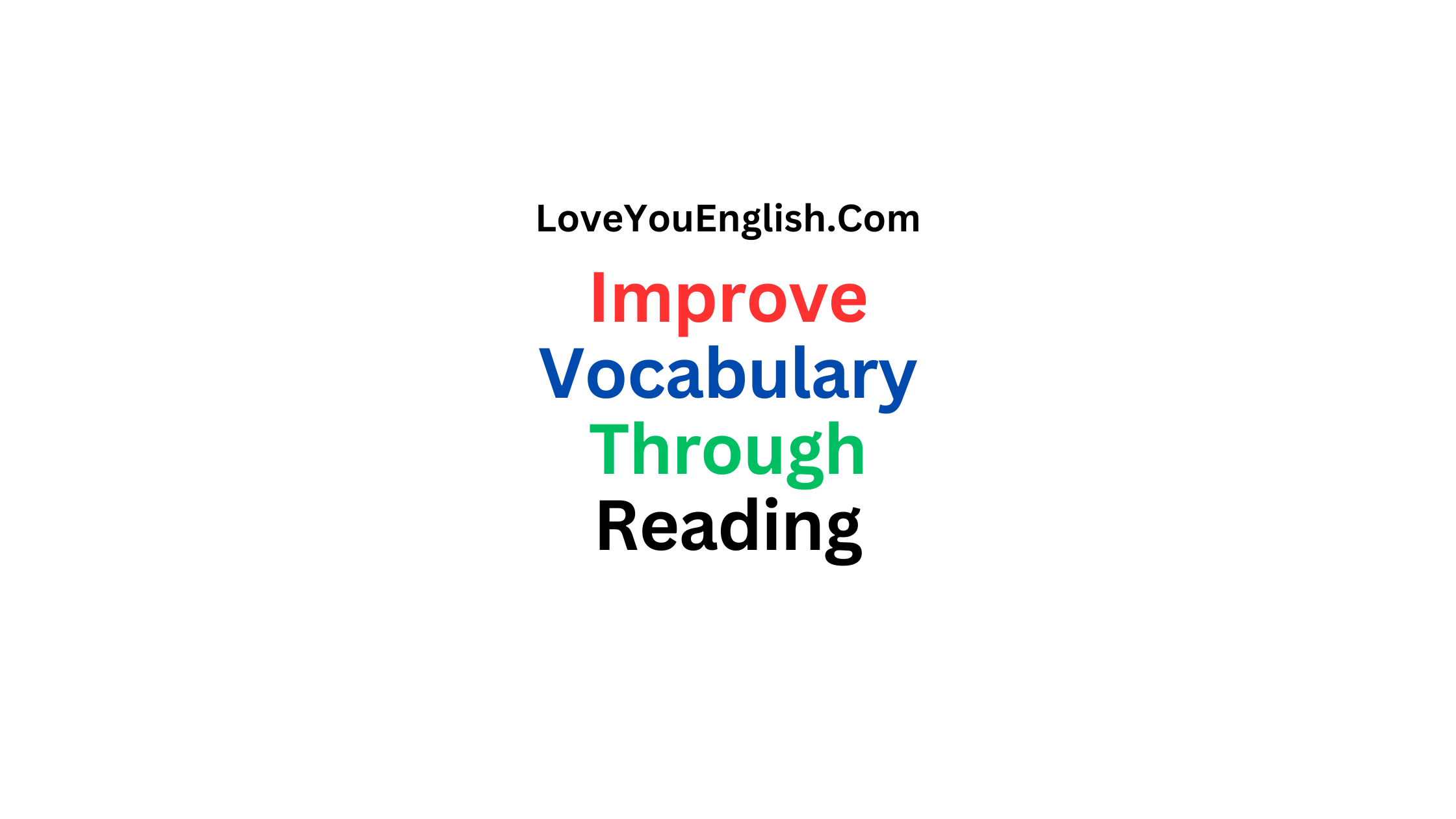How to Improve Your Vocabulary Through Reading
Reading is one of the most effective and natural ways to improve English vocabulary. When learners read regularly, they encounter new words in real contexts, which makes them easier to understand and remember. This topic explains how reading books, articles, and stories can help build strong vocabulary skills over time. Written in simple English, it is ideal for students, ESL learners, and self-learners. The article focuses on smart reading habits, choosing the right materials, and practical tips to learn new words without memorizing long lists. Improving vocabulary through reading not only strengthens language skills but also boosts confidence in speaking, writing, and comprehension.
Why Reading is Important for Vocabulary Development
Reading goes beyond just figuring out what happens in a story, or the points made in an article.
It introduces you to new words in a way that shows you what they mean and how to use them properly.
Here are some reasons why reading is super important for building your vocabulary:
Contextual Learning: When you read, you come across words in certain situations. This helps you get a better grasp of what they mean compared to just checking a dictionary.
Diverse Vocabulary: Exploring different types of books lets you see various writing styles and word choices. For instance, reading fiction, science papers, or poems introduces you to words that are used in unique ways.
Improved Retention: Interesting stories or informative pieces make it simpler to remember new words. When you link a word to a cool story or idea, it stays in your memory longer.
Enhanced Comprehension: Having a wider vocabulary helps you understand complicated texts better. The more words you know, the easier it is to understand complex ideas and arguments.
Strategies to Improve Your Vocabulary Through Reading
Here are some effective strategies to enhance your vocabulary through reading:
1. Read Regularly
The first step to improving your vocabulary is to make reading a regular habit.
Set aside a specific time each day for reading, whether it’s 15 minutes or an hour.
Consistency is key to building your vocabulary over time.
You can choose books, articles, blogs, or even comic strips—whatever interests you!
2. Choose a Variety of Genres
To broaden your vocabulary, explore various genres. Each genre has its own unique vocabulary.
Here are some genres to consider:
Fiction: Novels and short stories usually use a lot of emotional and descriptive words. They can teach you about feelings, places, and different character traits.
Non-Fiction: When you read biographies, history books, or self-help books, you come across technical words and factual language. This can help you build your vocabulary for school and work.
Poetry: Poetry often has fun with words and uses vivid images. Reading poetry can help you enjoy wordplay and discover new ways to express yourself.
Science Fiction and Fantasy: These types of stories use creative language and introduce new ideas, which can help you grow your vocabulary in a fun way.
3. Keep a Vocabulary Journal
A vocabulary journal is a useful tool for tracking new words.
Here’s how to maintain one:
Pick a Notebook: Get a special notebook or use an app on your device to write down any new words you find while reading.
Write Down Meanings: Note what these new words mean. Try to use easy words or examples to explain them better.
Make Sentences: Write sentences with the new words to practice using them correctly.
Check Back Often: Set aside time each week to look over your vocabulary notes. This will help you remember the new words you’ve learned.
More cool topics:
- Useful Resources for Reading in English
- Essay About North East India
- Practical Tips to Study Long Hours Without Getting Tired or Sleepy
- Fascinating Links Between Music and Language
4. Use Context Clues
When you come across a word you don’t know, try to understand its meaning through context clues.
Look at the sentences surrounding the word.
Consider these strategies:
Synonyms: Sometimes, the text may provide a synonym for the unknown word. For example, “The forest was dense, thick with trees and shrubs.” Here, “thick” helps you understand “dense.”
Antonyms: The text might also give you an antonym. For instance, “Unlike the arid desert, the region was lush and green.” Here, “arid” helps you understand that “lush” means abundant.
Examples: Authors often provide examples to clarify their points. For instance, “He was a voracious reader, devouring books on history, science, and literature.” The examples help you grasp the meaning of “voracious.”
5. Read Aloud
Reading aloud can enhance your vocabulary in several ways:
Pronunciation Practice: It helps you practice pronunciation, making it easier to recall and use new words correctly.
Increased Focus: Reading aloud requires more concentration, allowing you to absorb new words better.
Memory Reinforcement: Hearing the words can reinforce your memory, making it easier to remember them later.
6. Engage with the Text
Passive reading is less effective for vocabulary development.
Engage actively with the text by doing the following:
Highlight or Underline: Mark new words or phrases as you read. This will help you remember them later.
Ask Questions: Think critically about the text. Ask yourself questions about the content, the author’s purpose, and the meaning of new words.
Discuss with Others: Join a book club or discuss what you read with friends or family. Engaging in conversations helps reinforce your understanding and retention of new vocabulary.
7. Challenge Yourself
To grow your vocabulary, occasionally challenge yourself with more difficult reading material.
Choose books or articles that are slightly above your current level of understanding.
Here’s how to do it:
Select a Challenging Book: Pick a book that intrigues you but might be a bit difficult. Consider reading classics or award-winning literature.
Use a Dictionary: Keep a dictionary or a language app handy to look up unfamiliar words. This will help you learn their meanings immediately.
Summarize What You Read: After finishing a challenging text, write a summary in your own words. This exercise forces you to recall and use new vocabulary.
8. Set Specific Goals
Setting specific vocabulary goals can help you stay motivated.
Here are some examples:
Word Count Goal: Aim to learn a certain number of new words each week, like five or ten.
Reading Time Goal: Set a goal for how much time you want to dedicate to reading each day.
Genre Exploration Goal: Challenge yourself to read a book from a genre you’ve never explored before.
9. Utilize Online Resources
The internet is a treasure trove of resources for vocabulary improvement.
Here are some online tools to consider:
Online Dictionaries: Websites like Merriam-Webster or Oxford English Dictionary provide definitions, synonyms, and example sentences.
Vocabulary Apps: Use apps like Quizlet or Anki to create flashcards and quizzes to practice new words.
Reading Websites: Websites like Project Gutenberg offer free access to classic literature. This is a great way to explore diverse vocabulary.
10. Practice, Practice, Practice
Improving your vocabulary is a gradual process that requires consistent practice.
Here are some ideas to help you practice:
Writing Exercises: Write short stories, essays, or journal entries using new vocabulary words. This reinforces your learning and helps you remember how to use them.
Daily Conversations: Try to incorporate new words into your daily conversations. Using words in context will help solidify your understanding.
Word Games: Engage in word games like Scrabble, crossword puzzles, or online vocabulary quizzes. These can be both fun and educational!
Conclusion
Boosting your vocabulary by reading is an exciting adventure that leads to discovering new ideas and ways to express yourself.
If you make reading a daily habit, try out various types of books, and really think about what you read, you can greatly improve your vocabulary.
Don’t forget to keep a journal for new words, look for hints in the text, and practice regularly.
With some time and dedication, you’ll notice your vocabulary expanding, which will help you communicate better and understand the world around you.
So, grab a book, check out a new article, and start growing your vocabulary today!
Enjoy your reading!






